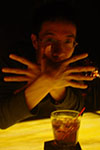Toh Hsien Min

Hsien Min Toh has published two collections of poetry, Iambus (1994) and The Enclosure of Love (2001). His work has also been published in periodicals such as Acumen, Atlanta Review, the London Review of Books, Poetry Ireland Review and Poetry Salzburg Review. He is also the founding editor of the Quarterly Literary Review Singapore (www.qlrs.com).
Snake Wine
Not until my second last morning did I break
beyond Pasteur Street to Ben Thanh market,
whose exterior did not hint at the dimensions
of its accepting harvests, and the way I got there
was by braving the Saigon traffic on a pillion seat,
darting in between and around swarms of scooters
and taxis trying to make it through the same junctions
all together, while the wind of my helpless movement
blew the scent of the woman in front of me,
with tickling wisps of her hair, at me; but this is not
about her, or how she would start with lightly humoured
petulance whenever I strode into her room. Rather,
after twenty minutes of flicking our fingers through
handmade chopsticks with accompanying ivory rests
and miniature dolls selling the fantasy of a Vietnam
subtly curved in áo dài, we came across rows and rows
of violin-case-shaped bottles filled with yellow wine
and a baby king cobra each, glassy eyed, stiff-tongued,
fangs visible as with intent, its patterned grey hood
enriched by a deep orange dot of Chinese wolfsberry.
I wondered if this could be an appropriate gift for you;
you hatched in the Year of the Snake, and you had the bite
of a woman. We assume these coils are dead,
but I remembered the news report on the Thai bachelor
who had uncorked a bottle only for the cobra
to spring out from organic hibernation to bury those fangs
deep into his knuckles, and I thought that you would
surely never taste the liquor if I told you that story,
which would mean it could rest on your bedside ledge
as a permanently dreamcatching souvenir of me.
Lemons
When life gives me lemons, I make lemonade.
As a boy, I detested the taste of lemons,
that sharp sourness captured in a grimace,
but recently I have had so much citrus fruit
that I’ve adjusted to the attack of the acid.
The other day I found myself biting into
lemon wedges for the juice, as though
they were orange slices. It made me think
how during our university days we bought
bags of lemons from Sainsbury’s because
they were cheap. I squeezed yellow halves
till my hands tingled for an hour, while you
turned a heap of sugar into syrup. No matter
what we felt about that white snowdrift of guilt,
we knew through trying that there was a point
at which a virtuous loss of sweetness
turned to an uncomfortable biting of tongues,
and if we were to let doubt cool all morning
in the fridge we would have the poor choice
of hot syrup or watering down painfully
squeezed lemonade. We hadn’t learnt, though,
that the same applies to unheaped denials,
that belief sustains the unspoken like a wound,
and that even if the nice thing about lemons
is that unlike blood oranges they don’t stain
no matter how careless you are with them,
their invisible ink shows when you try
suspected surfaces with heat. I suppose
you can’t compare lemons and oranges,
but if you know the only red nettings to end up
in my fruit compartment hold Valencia oranges,
you’ll understand my surprise, with the wedges,
to have discovered aftertaste, the lingering
in the mouth of a peculiarly silky sweetness
that is inestimable relief after the assault.
Trench Digging
When our boots hit the beach at Punggol, it was two to a trench
for all except the sick list, but then there was a command post
to be dug in, and so it was like coming on to score an own-goal
when one was supposed to have been on the bench,
because it seemed the sick list could come in handy.
All day we chipped at the sand. Letting our pride sting us
into motion, ten of us yoked our bad backs and asthma attacks
to the land. “C’mon there, give us a hand,” we poked out
at the drivers, more from the duty of making their lazy cigarettes
carry an incremental tithe in guilt, as the leftenants were away
poring over their maps, in the shade of a tembusu tree.
Oh, yes, 2LT Lee came around every now and then,
fresh as a temperate daisy, to show us how we could dig
faster than we could, but when his walkie-talkie charged the air
with static it seemed he had to be elsewhere. It was still us,
after all, who chopped the beach with changkuls, filled
three thousand sandbags, clanged iron pickets into resisting sand
with the monkey ram as though we were ringing the time,
and lined the walls with corrugated iron sheets to hold out
the slow, treacherous crumble. An hour after dusk, the final
sandbag in place, we squinted at the low prow and the crossbeams
of what we had built, and wished that we could shoot at it.
Then the leftenants moved in. Set up their signal sets
and the portable radio receiving 98.7FM. As for us,
we moped about the tonners, between the chilly night
and the stifle under canvas, the pebbles and the deep blue sea.
It seems the CO came round and was rather pleased.
One month on, our leftenants wore fresh bars on their epaulettes.
We knew what we had done, and though we didn’t care
about the trench I didn’t dare say that was good enough,
and what anger this could rouse would not be scattered
like phosphorous-tipped bullets into the invading sea.